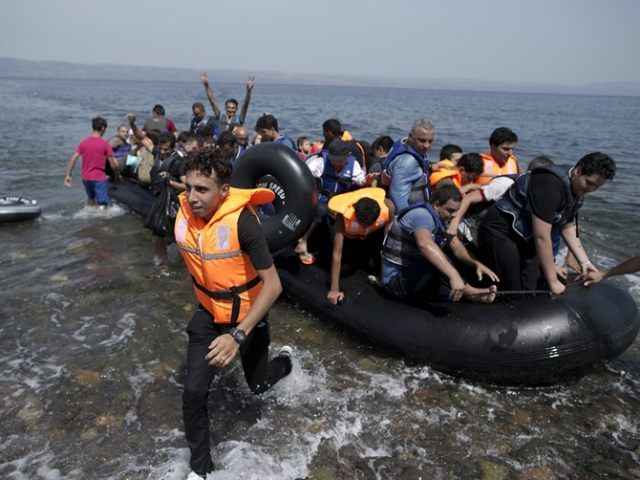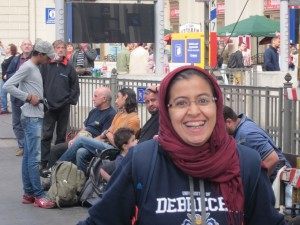BUDAPEST, Hungary (Sept. 8) – The pictures are stark but they don’t tell the whole story. They rarely do. As Europe wakes each day to yet another round of migrants stepping ashore in Greece and Italy, it would be easy to think that these are the ‘huddled masses, yearning to breathe free’ made famous by poet Emma Lazarus and immortalised on the Statue of Liberty pedestal.
Except the people arriving in Europe are anything but huddled and the numbers are staggering; an estimated 340,000 have arrived so far this year alone.
As Breitbart London has reported they are for the most part fit, able-bodied young men fleeing wars in Syria, Iraq and Libya looking to get a foothold in continental Europe so they can send for their families. Their journey is costing anywhere up to USD $10,000 each – most of which goes into the pockets of people smugglers – and facilitated along the way by eager helpers.
At Budapest’s main Keleti railway terminus you can meet them every morning; small groups of migrants with their pre-paid rail tickets for the journey to Vienna and onwards to Germany. About 20,000 migrants made their way through the western Balkans into Hungary and then Austria and Germany over the last weekend alone.
Zohoor Asiri (pictured below right), a Saudi Arabian student in Hungary, is one of the people who make the trip possible.
“I have come here as a friend to all because I can speak Arabic and show them how to deal with the authorities,” she said. “I show them where to get food, get new clothes, where to go for the ticket office – even where to charge their phones.
“There are plenty more people like me on the Greek islands where they land and in Italy also. It is a long dangerous trip with many frontiers to cross. I am happy to do what I can here to get them on their final step of their journey to Germany and Angel Merkel’s promised freedom.”
All along the overland trek the story is the same, according to Asiri. Once the migrants have landed after their Mediterranean crossing there are bureaucratic hurdles that have to be cleared and her local knowledge coupled language skills makes it possible.
So does social media. Every migrant group has at least one person clutching an iPhone. As much time is seemingly spent looking for somewhere to charge it as is spent checking the next leg of the journey. There is food, water and changes of clothing in abundance. All of it donated by charity.
I spoke to men from Syria and Iraq but also others who started out in Bangladesh, Iran, Pakistan, Eritrea and Sudan. They are wary of having their pictures taken but will talk on condition of anonymity.
Omar, 19, told me he left his home town of Lattakia just outside Damascus, Syria three weeks ago. A port city, it was a simple exchange of USD $5,000 with a people smuggler that put him on a boat.
“I come because I know Germany will give me a home,” he said. “My family will come too… very soon. No future in Syria. Too much fighting. Money from my family helps get me here and I will make my life work to get my mother, father, brothers, uncles here too.”
Omar and everyone travelling in his group of 12 men knows they will not be turned away. Angela Merkel has stated Germany expects to take at least 800,000 people classified as ‘asylum seekers’ this year. The figure is likely to go up and could hit one million, as Breitbart London has reported, a record number that shows no sign of stopping.
According to the European Resettlement Network, the benefits that accrue to Omar on arrival in Germany are immediate. He will stay at reception centres for up to six weeks and a maximum of three months. After that he will be offered either communal accommodation, or housed individually, depending on the policy of the federal state.
Asylum seekers who are unable to support themselves financially “receive what they need for their day-to-day life”, the German government says. Support varies from state to state, but generally includes direct benefits covering food and accommodation costs, plus limited cash spending money.
After holding a residence permit for 5 years, resettled refugees may apply for permanent residency subject to their:
- having a ‘secure livelihood’ and access to accommodation adequate for all members of their household;
- having access to the state pension (having paid contributions for at least 60 months) or a comparable private scheme;
- posing no threat to public order or safety; and
- demonstrating adequate knowledge of the German language, legal and social system by passing the final tests of the orientation and B1 level language courses.
All of the above helps to add to the ‘pull factor’ that draws migrants across the Mediterranean and on to a new life in Germany. Once settled and issued with a passport they are free to travel and work anywhere within the EU.
Germany’s population is shrinking, due to its low birth rate, and it could be argued that the country needs young people like Omar to ensure its future. As long as there is work.
Germany’s unemployment rate crept up to 6.4 percent in August, but the Federal Labor Agency says the job market in Europe’s largest economy remains robust.
The agency reported last month that 23,000 more people were jobless in August over July, for a total of 2.796 million people out of work. That sent the jobless rate up 0.1 percentage points from 6.3 percent in July.
History shows the rapid growth of a young adult population unable to find employment can lead to social unrest. That might be Germany’s future if the national economy stalls and, for better or worse, Omar might be part of it.


COMMENTS
Please let us know if you're having issues with commenting.